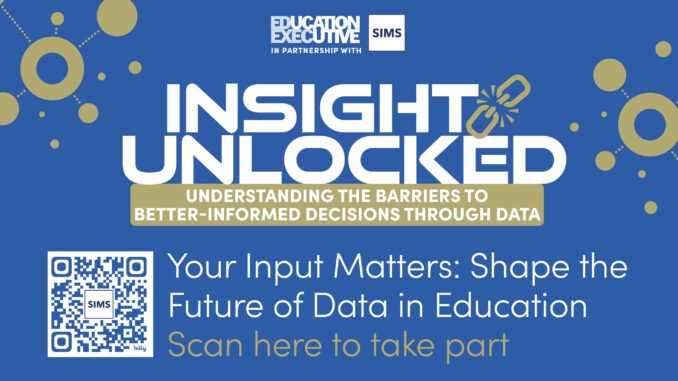
As schools continue to navigate the complexities of data management, your insights are crucial in shaping the future of how data can be used to drive positive change
To take part in our white paper research, click here: White Paper Research in partnership with SIMS – SBL Survey
Over the coming months, Education Executive is proud to partner with SIMS to delve into the most pressing issues and challenges surrounding data use and management in schools. At the heart of this initiative is our SBL survey – and if you haven’t participated yet, there’s still time to make your voice heard!
As part of this collaborative effort, we are excited to launch our new digital series, ‘Insight Unlocked’. This series will take an in-depth look at the challenges schools face in managing data effectively. In the first installment, we focus on one of the most frequently mentioned barriers: building data skills and improving data literacy.
The UK government has recently drawn attention to the growing digital skills gap and its significant impact on the country’s digital growth and innovation. This issue is particularly evident in the education sector, where the complexity of data systems in schools often presents a significant barrier. The result is a cycle where schools generate vast amounts of valuable information but face obstacles in turning that data into actionable insights. This not only affects operational efficiency but also limits the ability to make strategic decisions.
Technophobia and Change
A major factor contributing to these challenges is technophobia – the fear or anxiety surrounding the use of new technology. For many school staff, the introduction of complex data systems can feel overwhelming. This resistance is often compounded by a lack of adequate training and support. Without clear guidance and practical, hands-on learning opportunities, staff may struggle to build the confidence needed to navigate new systems effectively.
Overcoming technophobia and resistance to change is about more than just addressing the skills gap – it’s about building confidence and empowering educators and school staff. This can only be achieved through robust support systems that provide practical, applicable training and access to knowledge resources tailored to their needs.
Pace of Learning
In today’s fast-paced technological landscape, systems evolve rapidly, often requiring regular updates and adjustments to remain efficient and effective. However, without adequate support and clear communication, school business leaders and staff may struggle to keep up with these changes. This can leave them feeling frustrated, overwhelmed, or even falling behind in their ability to fully utilise the tools at their disposal.
One common challenge is the natural resistance to change that arises when people become accustomed to a particular system. Once familiar with a tool or process, staff may feel hesitant to embrace updates or new technologies. They might perceive these changes as unnecessary, particularly if the current system seems to be functioning adequately for their needs. This perspective is often rooted in a lack of understanding about the purpose and benefits of updates. Without a clear explanation of how updates improve functionality, enhance security, or address specific challenges, staff may view them as disruptive rather than helpful.
Inconsistency in Systems
Not all systems are created equal, and in the context of schools, the use of multiple platforms and systems is often the norm. One key issue is the fragmentation of data. With information spread across various systems, it becomes difficult to achieve a cohesive view of school operations. Important data may be siloed, making it easy to overlook or miss critical insights.
Moreover, the lack of seamless integration between systems can lead to inconsistent or incomplete reporting. For instance, key metrics that could inform decision-making may remain buried within one platform, inaccessible to those who need it most. As a result, school leaders might make decisions based on incomplete or outdated information.
Have Your Say
The challenges above highlight the critical need for a deeper understanding of how schools can navigate the complexities of data use and management. By participating in our white paper research in partnership with SIMS, you can help shape the conversation and contribute valuable insights that drive practical solutions. Your input is essential in addressing these barriers and empowering schools to unlock the full potential of their data. Don’t miss the opportunity to make your voice heard -take the survey today and join us in building a smarter, data-driven future for education.
Win £150 in Amazon Vouchers! We value your insights, and as a token of appreciation for completing our survey, you’ll be entered into a draw for a chance to win £150 in Amazon vouchers.
This is a sponsored article, brought to you by SIMS in partnership with Education Executive.

To take part in our white paper research, click here: White Paper Research in partnership with SIMS – SBL Survey


Be the first to comment